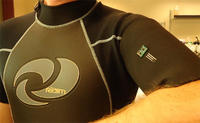-
The art of signature replication
A Rockville, Maryland company’s signature replication technology is so advanced, DHS sends its agents there to learn; using sophisticated computer software and its Autopen signing machines, Damilic is capable of replicating signatures that so closely resemble the original hand written version, forensic scientists are needed to be able to tell the difference
-
-
Recent deluge of cyber attacks results in record spending
The deluge of high profile cyber attacks on major corporations and government entities like the U.S. Senate, the CIA, and Sony has driven a sharp increase in demand for cyber security experts; in the first six months of this year alone, cyber attacks and data breaches have cost U.S. companies approximately $96 billion, nearly the total for 2010; analysts project 2011 to be the busiest year yet with an estimated $75.6 billion in cyber security spending, surpassing last year’s record $63 billion
-
-
New tools identify a person's expression, estimate their mood

Biometrics company releases software that allows users to “cartoonize” photos; cartoons aside, the company announced the release of more free API (application programming interface) face detection tools: the service can identify a person’s expression as well as estimate their mood
-
-
Combating counterfeit microchips // by Dr. James Hayward, Ph.D, Sc.D.
Dr. James Hayward, the chairman, president, and CEO of Applied DNA Sciences, argues that the U.S. government needs to do more to prevent corrupted microchips from entering U.S. computers that make it easier for hackers and foreign governments to infiltrate networks
-
-
Malware imported into U.S. on foreign-made components

A high level DHS official acknowledged that malware built into imported electronic components sold in the United States poses a serious threat to U.S. economy and security; he also said it was a complex threat which the federal government has been trying to address in different ways; Greg Schaffer, acting deputy undersecretary for the National Protection and Programs Directorate at DHS, said the threat is “one of the most complicated and difficult challenges we have”
-
-
ASIS Conference: Securing the global supply chain
At the upcoming annual ASIS International security conference, attendees will have the opportunity to learn more about protecting the global supply chain at one of the many educational sessions; officials fear that a terrorist attack on a seaport could cripple a local economy and have global repercussions. As nearly 90 percent of the world’s goods are still shipped via containers on massive transport ships
-
-
Sensors printed on wetsuits detect explosives, other hazards

UC Sand Diego researcher has successfully printed thick-film electrochemical sensors directly on flexible wetsuit material, paving the way for nano devices to detect underwater explosives or ocean contamination; UCSD has a full U.S. patent pending on the technology, and has begun talks on licensing the system to a Fortune 500 company
-
-
Critical vulnerability found in Apple iPhones and iPads
Apple is scrambling to develop a fix for a software vulnerability that leaves its iPhone, iPad, and iPod Touch devices susceptible to hackers; according to Germany’s Federal Office for Information Security, which discovered the critical software vulnerability, hackers can steal confidential data from the devices without the user even suspecting it by exploiting a flaw in the program that allows users to “jail-break” their devices and run non-Apple software
-
-
World's first cardboard vacuum cleaner unveiled

A U.K. vacuum cleaner manufacturer will market a high performance vacuum cleaner constructed out of recycled and recyclable materials; the device was designed by an industrial design student; the corrugated cardboard panels that form the body of the machine are easily replaced if damaged and cost just a tenth of the price of an equivalent plastic panel
-
-
New technology increase potency of beam weapons

Laser scientists and engineers have long recognized that direct-diode lasers can offer significant advantages over other laser technologies due to their efficiency, reliability, compactness, and relatively low cost; applications for direct-diode lasers have been limited, however, owing to their low brightness — a combination of lower power and poorer beam quality relative to alternative laser technologies; a Massachusetts-based company, using wavelength beam combining (WBC) technology, is offering a way to solve this problem — allowing direct-diode lasers to be used in demanding industrial applications — and in effective beam weapons
-
-
IBM helps Sensus secure the smart grid
In a move that could help bolster U.S. smart grids against cyberattacks, Sensus recently announced that it will incorporate IBM’s encryption and key management technologies into its smart grids; the company will use IBM’s cyber security solutions in its FlexNet communications system for electric, gas, and water utility smart grid endpoints including meters and automated distribution devices
-
-
U.K. awards 160 million Pound nuclear decommissioning contracts

The decommissioning of one of U.K. oldest nuclear plants — Sellafield, located close to the village of Seascale on the coast of the Irish Sea in Cumbria, England — has taken a giant step forward thanks to the awarding of three waste retrieval contracts worth more than 160 million Pounds
-
-
Montana floods exacerbate Exxon oil spill

Flooding in Montana has exacerbated the effects of an oil spill and made clean up more difficult for Exxon Mobil; it is estimated that roughly 750 top 1,000 barrels of crude oil have leaked into the Yellowstone River near Billings, Montana; the pipeline has been shut down, but flooding in the area has made it difficult for clean-up crews to find the source of the leak
-
-
A first: Flying car cleared for road

The U.S. Department of Transportation gave Massachusetts-based Terrafugia two important exemptions which would allow the company to offer its flying car — the Transition — to customers next year; the exemptions allow the company to use different tires and different laminated protective glass, and come on top of a 110 lb. allowance the FAA gave the company last year; these allowance and exemptions mean the flying car will not be treated as plane by the FAA, and those who fly it will not have to obtain a pilot license
-
-
MLB, DHS crack down on counterfeiting at All-Star games
Major League Baseball (MLB), the Phoenix police department, and a host of federal, state, and local law enforcement agencies are joining forces to combat counterfeit ticket and merchandise sales during the 2011 MLB All-Star Week; undercover investigators will be roaming the stadium grounds and convention center
-
More headlines
The long view
Factories First: Winning the Drone War Before It Starts
Wars are won by factories before they are won on the battlefield,Martin C. Feldmann writes, noting that the United States lacks the manufacturing depth for the coming drone age. Rectifying this situation “will take far more than procurement tweaks,” Feldmann writes. “It demands a national-level, wartime-scale industrial mobilization.”
Trump Is Fast-Tracking New Coal Mines — Even When They Don’t Make Economic Sense
In Appalachian Tennessee, mines shut down and couldn’t pay their debts. Now a new one is opening under the guise of an “energy emergency.”
Smaller Nuclear Reactors Spark Renewed Interest in a Once-Shunned Energy Source
In the past two years, half the states have taken action to promote nuclear power, from creating nuclear task forces to integrating nuclear into long-term energy plans.
